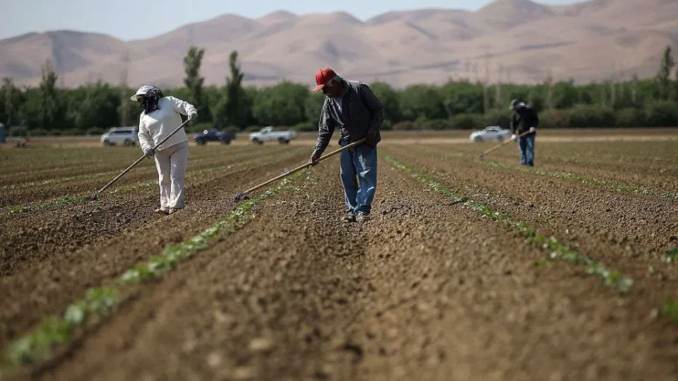
McFARLAND, California . – Xiomara Valderrama often spends her days picking grapes in California’s Central Valley, where a quarter of the food the United States consumes is produced . But she has been unable to work since she learned that her 5-year-old son may have been exposed in his nursery to COVID-19, the disease caused by the coronavirus.
Valderrama will have to wait two weeks for the boy’s test results, which means two weeks with no income to pay rent and other basic needs. “It’s going to be stressful to get the money,” she says.
California CEO Grapery is trying to make sure employees get paid for lost hours . But thousands of undocumented workers scattered throughout this agricultural region, vulnerable and mostly Latino, suffer intense fear and are reluctant to report if they are infected with COVID-19 , although some doctors even promise that they will not tell anyone.
The United Farm Workers union estimates that 70% of farm workers in this region are in the country illegally , which means they do not have access to state or federal unemployment benefits, and risk losing their livelihood. The need to work forces some to ignore their exposure to COVID-19.
“ People are afraid to go to the doctor . You are afraid to go to the hospital. He does not go to his monthly visits to the doctor because he fears that the result will be COVID-19, ”explains Hernán Hernández, executive director of the California Farmworker Foundation, a non-profit organization that offers resources and services to farmworkers.
The infection rate among Latinos is higher than the rest of the country , and the community has also been disproportionately damaged by the economic crisis associated with the pandemic, the Pew Research Center reported Tuesday .
Salvador, an undocumented farmworker and father of four children, believes he may have been exposed to the coronavirus three weeks ago, when a friend who tested positive visited his home. He decided, however, not to take the exam because he is afraid that testing positive means being cut off from work and unable to earn money for his family.
The roughly $ 500 that he and his wife bring home each week just barely covers the bills , so he kept working. He says he did not inform his boss of his possible infection because he had no symptoms. Instead, he and other workers who thought they might have been infected reported discreetly to each other to keep a safe distance.
Ernestina, who works with hundreds of others at a pistachio packing plant, says she caught it and spent a month at home , missing two weeks of pay. But before he got sick, he says, he saw how others hid their symptoms , holding back their coughs as long as they could, for example.
Dr. Harjeet Brar, president of Good Samaritan Hospital in Bakersfield, told Noticias Telemundo that his medical team does not ask patients about their immigration status.
“It is by no means our purpose, we are here to help,” he says, adding: “We just want them to be tested so we can protect their families.”
His hospital has an agreement with the California Farmworker Foundation and Kern County to provide California’s agricultural communities with a mobile testing unit.
Governor Gavin Newsom has pledged $ 52 million in aid to the Central Valley for coronavirus testing and contact tracking, with the ambitious goal of slowing the spread of the virus in the region. In mid-April, he said the state would reach an agreement with philanthropic groups to offer disaster relief to undocumented immigrants facing the coronavirus and unable to benefit from other pandemic assistance programs.
We are deeply grateful to the people who fear deportation, but continue to meet the essential needs of millions of Californians,” the governor said at the time, adding that many undocumented immigrants work in essential sectors such as health, agriculture and feeding.
Newsom has signed an order for essential workers, including those in the fields, to have two weeks of additional sick pay . The state has also partnered with county agricultural commissioners to help distribute 12.6 million surgical masks to agricultural employees, in addition to other personal protective equipment.



Be the first to comment